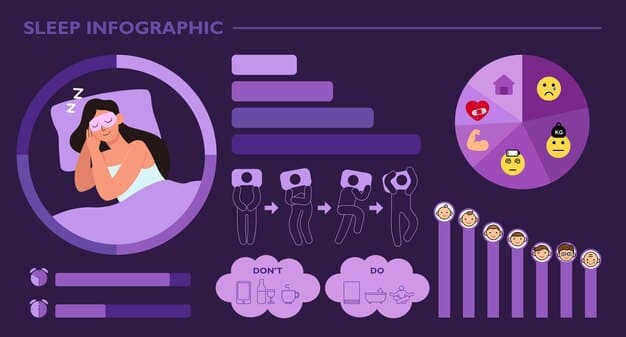Optimize Sleep for a 25% Cognitive Boost: The Science of Sleep

Optimizing your sleep cycle can significantly enhance cognitive functions by up to 25% through understanding the intricate stages of sleep and implementing strategies to improve sleep quality and duration.
Are you looking to sharpen your mind and boost your cognitive abilities? The secret might lie in optimizing your sleep cycle. The Science of Sleep: How Optimizing Your Sleep Cycle Can Improve Cognitive Function by 25% explores how understanding and improving your sleep can lead to significant gains in cognitive performance.
Understanding the Basics of Sleep Science
Sleep isn’t just downtime; it’s a crucial period for your brain to consolidate memories, repair cells, and prepare for the day ahead. Delving into the science of sleep reveals the intricate processes that dictate its quality and impact on cognitive function.
The Stages of Sleep
Sleep progresses through several distinct stages, each with unique characteristics and benefits. Understanding these stages can help you appreciate the complexity of sleep and its importance for overall health.
- Stage 1 (NREM 1): This is the transition phase between wakefulness and sleep, characterized by slow eye movements and relaxed muscles.
- Stage 2 (NREM 2): During this stage, you become less aware of your surroundings, and your heart rate and body temperature drop.
- Stage 3 (NREM 3): Often referred to as deep sleep or slow-wave sleep, this is when your body repairs tissues, builds bone and muscle, and strengthens the immune system.
- REM (Rapid Eye Movement) Sleep: This is the stage most associated with dreaming, and it’s crucial for cognitive functions like memory consolidation and learning.

Each stage plays a vital role in physical and cognitive restoration. Disruptions to these cycles can lead to various health problems, including impaired cognitive function. Optimizing your sleep means ensuring you spend adequate time in each stage.
How Sleep Affects Cognitive Function
The connection between sleep and cognitive function is undeniable. Quality sleep is essential for memory consolidation, attention, problem-solving, and decision-making. Inadequate sleep can impair these abilities.
Memory consolidation is one of the key cognitive processes that benefit from sleep. During sleep, the brain replays and strengthens neural connections associated with newly learned information. This process transforms short-term memories into long-term ones.
Attention and focus are also significantly affected by sleep. Sleep deprivation leads to decreased alertness, making it difficult to concentrate and maintain focus. This can impact productivity, learning, and even safety.
Problem-Solving and Decision-Making
Sleep also plays a role in higher-level cognitive functions such as problem-solving and decision-making. When well-rested, the brain is better able to analyze complex information, identify patterns, and make sound judgments.
Chronic sleep deprivation can lead to poor judgment, increased risk-taking behavior, and difficulty in making rational decisions. Prioritizing sleep can enhance cognitive performance and improve decision-making abilities.
In summary, sleep is not just a period of rest but an active process that supports a wide range of cognitive functions. Understanding and optimizing your sleep can lead to significant improvements in mental performance.
Strategies for Optimizing Your Sleep Cycle
Optimizing your sleep cycle involves adopting habits and practices that promote better sleep quality and duration. Several strategies can help you achieve this goal. Here are some to increase your understanding of optimizing your sleep cycle:
- Establish a Consistent Sleep Schedule: Going to bed and waking up at the same time every day, even on weekends, helps regulate your body’s natural sleep-wake cycle.
- Create a Relaxing Bedtime Routine: Engaging in calming activities before bed, such as reading or taking a warm bath, can help you wind down and prepare for sleep.
- Optimize Your Sleep Environment: Ensure your bedroom is dark, quiet, and cool. Use blackout curtains, earplugs, or a white noise machine to minimize disturbances.
Consistent sleep schedules reinforce the body’s circadian rhythm, making it easier to fall asleep and wake up at the appropriate times. A relaxing bedtime routine signals to your brain that it’s time to sleep, promoting a smoother transition into slumber.
Dietary Considerations
What you eat and drink can also impact your sleep. Avoid caffeine and alcohol close to bedtime, as they can disrupt sleep patterns. A light snack containing complex carbohydrates can help promote relaxation.
Hydration is also important; ensure you’re adequately hydrated throughout the day. However, avoid drinking large amounts of fluids before bed to reduce the likelihood of nighttime awakenings. Moreover, a balanced diet rich in vitamins and minerals supports overall health, contributing to better sleep quality.
Incorporating these strategies into your daily routine can significantly improve your sleep cycle, leading to enhanced cognitive function and overall well-being. The key is consistency and tailoring these practices to your individual needs and preferences.
The Role of Technology in Monitoring Sleep
Technology offers several tools for monitoring and improving your sleep. Sleep trackers, wearable devices, and smartphone apps can provide valuable insights into your sleep patterns and quality. Here is how this technology can help with monitoring sleep:
Sleep trackers typically use accelerometers to monitor movement during sleep. While not as accurate as clinical sleep studies, they can provide a general overview of your sleep duration and stages. Many wearable devices also track heart rate, which can offer additional information about sleep quality.
Smartphone apps often use the device’s microphone to detect sounds associated with sleep, such as snoring. Some apps also offer guided meditations and relaxation techniques to help you fall asleep.
Interpreting Sleep Data
While these technologies can be helpful, it’s important to interpret the data with caution. Sleep trackers are not always accurate, and their primary value lies in identifying trends over time. Focus on patterns and changes rather than individual data points.

If you’re concerned about your sleep, consider consulting a healthcare professional. A sleep study, or polysomnography, conducted in a sleep lab, can provide a more comprehensive assessment of your sleep patterns and identify any underlying sleep disorders. It can also help with monitoring sleep.
In summary, technology can be a useful tool in monitoring and improving your sleep, but it’s important to use it judiciously and seek professional advice when needed. Combining technological insights with evidence-based sleep strategies can lead to significant improvements in sleep quality.
Sleep Disorders and Their Impact on Cognition
Sleep disorders can significantly disrupt your sleep cycle and impair cognitive function. Common sleep disorders include insomnia, sleep apnea, restless legs syndrome, and narcolepsy. Each of these conditions can have unique effects on cognitive performance.
Insomnia, characterized by difficulty falling asleep or staying asleep, can lead to daytime fatigue, impaired concentration, and memory problems. Chronic insomnia can also increase the risk of anxiety and depression, further affecting cognitive function.
- Sleep Apnea: This disorder causes pauses in breathing during sleep, leading to frequent awakenings and reduced oxygen levels in the blood.
- Restless Legs Syndrome: This condition causes uncomfortable sensations in the legs and an irresistible urge to move them, disrupting sleep.
- Narcolepsy: This neurological disorder affects the brain’s ability to regulate sleep-wake cycles, leading to excessive daytime sleepiness and sudden sleep attacks.
Sleep apnea can lead to cognitive deficits, including impaired attention, memory, and executive function. The reduced oxygen levels associated with sleep apnea can also damage brain cells over time. Restless legs syndrome primarily affects sleep quality, leading to daytime fatigue and cognitive impairment. Narcolepsy can have profound effects on cognitive function, affecting attention, memory, and decision-making. The unpredictable nature of sleep attacks can also disrupt daily activities and cognitive performance.
Seeking Professional Help for Sleep Problems
If you suspect you have a sleep disorder, seeking professional help is crucial. A healthcare provider can conduct a thorough evaluation, diagnose the condition, and recommend appropriate treatment options.
Treatment options may include lifestyle modifications, such as improving sleep hygiene, cognitive-behavioral therapy for insomnia (CBT-I), and medical interventions, such as continuous positive airway pressure (CPAP) therapy for sleep apnea. CBT-I is a structured program that helps individuals identify and change negative thoughts and behaviors that contribute to insomnia. CPAP therapy involves wearing a mask that delivers pressurized air to keep the airways open during sleep.
Addressing sleep problems can have a significant impact on cognitive function and overall quality of life. Early diagnosis and treatment can help prevent long-term cognitive deficits and improve daily functioning. Improving sleep problems is crucial for overall health.
Long-Term Cognitive Benefits of Consistent Sleep
Prioritizing consistent, quality sleep can yield long-term cognitive benefits. Studies have shown that individuals who maintain healthy sleep habits throughout their lives tend to have better cognitive function, memory, and overall brain health.
Chronic sleep deprivation can accelerate age-related cognitive decline and increase the risk of neurodegenerative diseases such as Alzheimer’s disease, and improving consistent sleep can improve brain health.
The benefits of consistent sleep extend beyond cognitive function. Adequate sleep also supports physical health, emotional well-being, and overall quality of life. Prioritizing sleep is an investment in your long-term health and happiness.
In conclusion, understanding the science of sleep and optimizing your sleep cycle can lead to significant improvements in cognitive function and overall well-being. By adopting healthy sleep habits, monitoring your sleep, and seeking professional help when needed, you can unlock your brain’s potential and enjoy a sharper, more focused mind.
| Key Point | Brief Description |
|---|---|
| 😴 Sleep Stages | Understanding NREM and REM for cognitive benefits. |
| 🧠 Cognitive Impact | Sleep enhances memory, attention, and problem-solving. |
| 🌙 Sleep Optimization | Consistent schedules and relaxing routines are key. |
| 🩺 Sleep Disorders | Seek help for issues like insomnia and sleep apnea. |
Frequently Asked Questions
▼
Sleep facilitates memory consolidation by replaying and strengthening neural connections. This process transforms short-term memories into long-term ones, enhancing recall and retention.
▼
Signs of a sleep disorder include difficulty falling asleep or staying asleep, daytime fatigue, snoring, pauses in breathing during sleep, and an irresistible urge to move your legs at night.
▼
Yes, sleep trackers and smartphone apps can provide insights into your sleep patterns, helping you identify areas for improvement. However, it’s important to interpret the data with caution and seek professional advice if needed.
▼
CBT-I is a structured program that helps individuals identify and change negative thoughts and behaviors that contribute to insomnia. It often involves techniques such as stimulus control and relaxation training.
▼
A relaxing bedtime routine might include taking a warm bath, reading a book, practicing deep breathing exercises, or listening to calming music. The key is to find activities that help you wind down and prepare for sleep.
Conclusion
Optimizing your sleep cycle is a powerful strategy to enhance cognitive function and overall well-being. By understanding the science of sleep and implementing effective strategies, you can unlock your brain’s potential and improve your daily life. Prioritize sleep as an investment in your long-term health and happiness.





